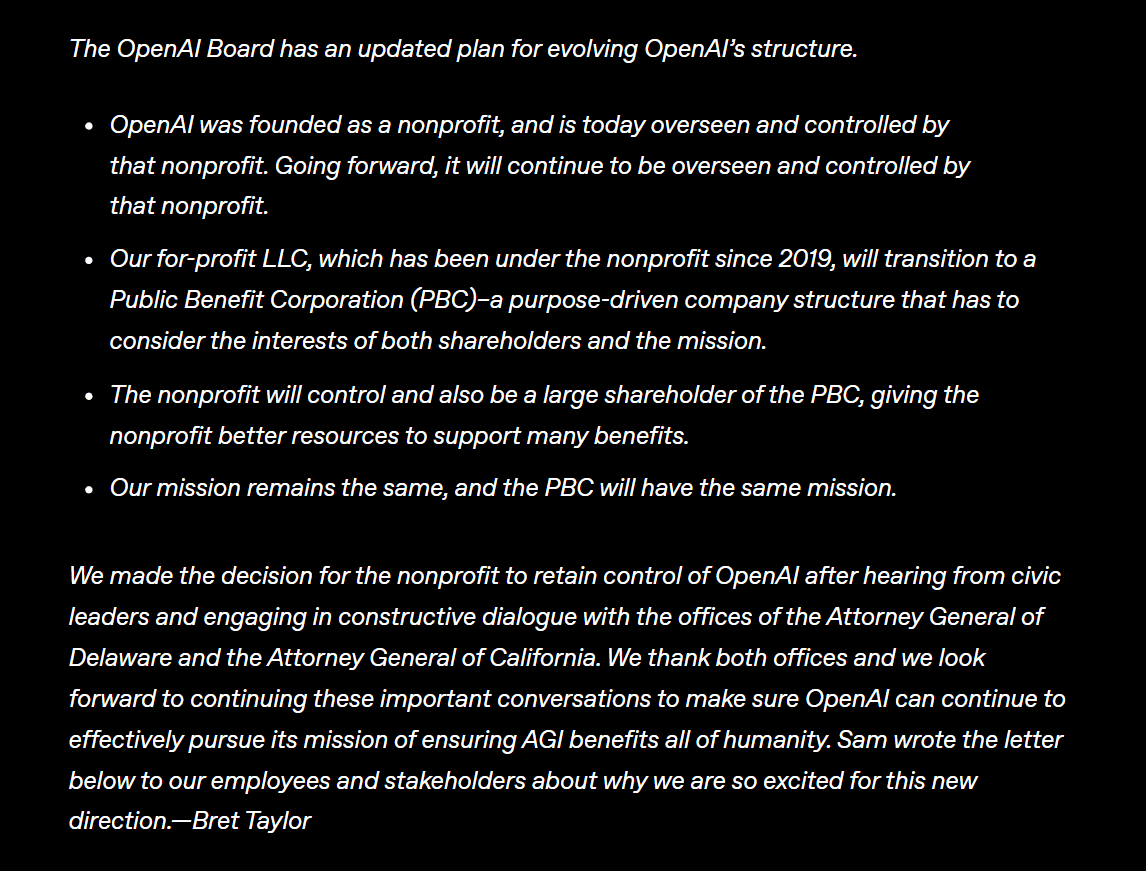OpenAI, the creator of ChatGPT, has officially abandoned its plans to transition into a for-profit company, reinforcing its dedication to its original nonprofit structure. This decision marks a significant shift in strategy for the AI research and deployment company, which had previously explored various for-profit models to fund its ambitious projects.
Key Takeaways:
- OpenAI reaffirms its commitment to its nonprofit status.
- Plans to convert to a Public Benefit Corporation (PBC) have been scrapped.
- The decision aims to maintain OpenAI’s ability to raise funds for AI development without compromising its core mission.
- Elon Musk’s lawsuit alleging breach of foundational agreements played a role in the decision.
In a blog post, OpenAI confirmed that it will continue to operate under the oversight and control of its nonprofit entity. This decision comes after internal discussions and external pressures, including a lawsuit from Tesla CEO Elon Musk, who co-founded OpenAI.
The initial consideration of a for-profit structure stemmed from the immense capital required for AI development. OpenAI estimates that it needs hundreds of billions of dollars, potentially trillions, to achieve its goals in AI research and deployment. CEO Sam Altman emphasized the importance of securing these funds without compromising the company’s mission.
Background: OpenAI’s Structure
Founded in 2015 as a nonprofit research company, OpenAI aimed to advance digital intelligence for the benefit of humanity. In 2019, OpenAI created a for-profit subsidiary to attract investment while maintaining nonprofit control.
However, this hybrid structure has faced scrutiny, especially with the rapid commercialization of AI technologies. The tension between OpenAI’s mission and the pressures of generating revenue led to internal debates about the best path forward.
Elon Musk’s Lawsuit
Elon Musk, a co-founder of OpenAI, filed a lawsuit against Sam Altman and OpenAI, alleging that they violated the terms of Musk’s foundational contributions to the charity. Musk claimed that Altman secretly planned to convert OpenAI into a for-profit entity, deviating from the original nonprofit mission.
The lawsuit highlighted the conflicting visions for OpenAI’s future and raised questions about the company’s commitment to its founding principles. While OpenAI has denied Musk’s allegations, the legal challenge added to the complexity of its strategic decisions.
Financial Projections and Revenue Growth
Despite remaining a nonprofit, OpenAI has ambitious financial projections. The company expects its revenue to reach $29.4 billion by 2026. It forecasts revenues of $12.7 billion in 2025. These figures reflect the increasing demand for AI technologies and OpenAI’s ability to monetize its innovations.
In March, OpenAI raised $40 billion from Softbank at a $300 billion valuation. This funding will support OpenAI’s ongoing research and development efforts, as well as its expansion into new markets and applications.
Implications for the AI Industry
OpenAI’s decision to remain a nonprofit has broader implications for the AI industry. It underscores the importance of ethical considerations and mission-driven innovation in the development and deployment of AI technologies. By prioritizing its nonprofit status, OpenAI signals its commitment to using AI for the benefit of humanity, rather than solely for profit.
This move may also influence other AI companies to consider alternative organizational structures that balance commercial interests with social impact. As AI becomes more pervasive, the debate over its governance and ethical implications will continue to intensify.

The Future of OpenAI
OpenAI’s recommitment to its nonprofit status sets the stage for its next chapter. The company will continue to focus on advancing AI research, developing innovative applications, and addressing the ethical challenges of AI. By maintaining its nonprofit mission, OpenAI aims to build trust with the public and ensure that AI benefits all of humanity.
The company faces challenges, including the need to secure significant funding, manage competition from other AI firms, and navigate the evolving regulatory landscape. However, with its talented team, cutting-edge technology, and renewed commitment to its mission, OpenAI is well-positioned to lead the way in the AI revolution.